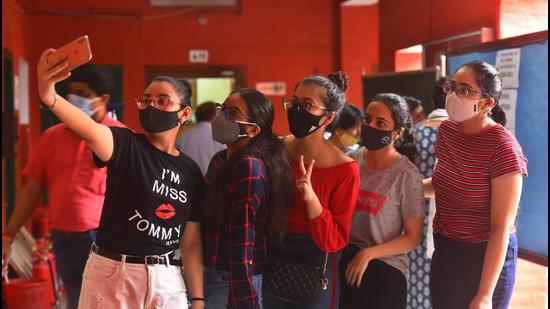An academic year like no other comes to an end
Principals and teachers across several schools said that the entire academic year was rife with uncertainties over the conduct of exams and the online teaching-learning process.
From being unable to attend school in person for most of the year to having to rely on online learning — an exercise that brought to the fore a glaring digital divide among students — the class of 2020-21 has been unlike any other till date. There were other novelties too. The academic session went on for 16 months — from end-March 2020 to end-July 2021— on account of the Covid-19 pandemic, and the batch became the first to graduate without appearing for the Board exams, which were cancelled also on account of the pandemic.

The year, in short, was challenging not just for teachers and students but also for education officials, including Central Board of Secondary Education (CBSE) employees and school principals, who had to evolve and adapt to the “new normal”.
Principals and teachers across several schools said that the entire academic year was rife with uncertainties over the conduct of exams and the online teaching-learning process.
Mena Mittle, vice-principal of Modern Public School in Shalimar Bagh, said, “Teachers had to extend constant support to students during the year; there was so much uncertainty over the cancellation of exams and even the exam pattern. The pandemic also heaped a lot of stress on students for whom the future appeared quite uncertain. They were unable to interact with their peers or teachers in their final year of school.”
Due to the revised assessment policy devised by the board, in the absence of board examinations, schools had their work cut out for them while tabulating scores as they had to feed in marks of students while keeping the moderation policy in mind.
Before the pandemic, the board was responsible for tabulating results through head examiners and nodal centres.
“While the portal (developed by CBSE to upload marks) calculated the weightage of marks accordingly, schools had to feed in marks and ensure that the moderation system was implemented. The high pass percentage this year is also because around 60% weightage was given to class 10 and 11 scores of students,” Mittle said.
Deepa Chugh, a class 12 coordinator at The Indian School, who teaches political science, said teachers too struggled with the changes but managed to learn new ways of teaching in the process. “Connecting with students was difficult in the past year because not all could get their cameras on during online classes. Face-to-face interactions help us assess whether a student is understanding concepts or not, and structure our classes accordingly.”
However, Chugh noted that students who could have scored a perfect 100 in a written exam were unable to do so this time. “We couldn’t give them 100 because of the Class 10 results which was already calculated by CBSE and put on the website. CBSE did not allow us to increase their marks to 100. We could do a maximum moderation of only one or two marks,” she said.
The Class 12 theory papers were initially slated to begin in May and end by June 14 but due to the second wave of Covid-19, the board cancelled class 10 and 12 exams, surrendering to growing demands from parents and other stakeholders.
On June 17, the board announced a revised assessment scheme devised by a 13-member committee which gave 30% weightage each to scores from classes 10 and 11, and 40% weightage to class 12 internal tests, including unit test, mid-terms and pre-boards.
The board also formulated a strict moderation policy and a results committee monitored the process to ensure standardisation of process across schools, and no inflation of marks by schools.
CBSE officials conducted several webinars with school officials to explain the moderation policy in detail and reduce any errors. The board also created a portal for schools to fill in the scores of students, and it would automatically adjust the final scores as per the norms.
Dr Sanyam Bhardwaj, controller of examinations, CBSE, said that the comprehensive result compilation and tabulation system built by the board not only helped schools in verifying the Class 10 information but also in uploading the class 11 and 12 scores. “The system guided schools for moderation at every step, so that schools do not commit an error and are aware of the permissible moderation limit,” stated Bhardwaj.
In the absence of board exams and admit cards, the education board also devised another portal for students to fill in their details and obtain a roll number to check their results this year.
Kunal Singh, 18, a student of Rajkiya Pratibha Vikas Vidyalaya in Nand Nagri, who scored an aggregate of 91%, said he was happy with the result. “Studying remotely for an entire year is not easy. From network issues to problems with audio and video quality, there were several disruptions. Despite these obstacles, we gave our best,” said Singh, who plans to pursue his graduation in computer science.
Stay updated with all top Cities including, Bengaluru, Delhi, Mumbai and more across India. Stay informed on the latest happenings in World News along with Delhi Election 2025 and Delhi Election Result 2025 Live, New Delhi Election Result Live, Kalkaji Election Result Live at Hindustan Times.
Stay updated with all top Cities including, Bengaluru, Delhi, Mumbai and more across India. Stay informed on the latest happenings in World News along with Delhi Election 2025 and Delhi Election Result 2025 Live, New Delhi Election Result Live, Kalkaji Election Result Live at Hindustan Times.
 Get alert on your mobile and email as soon as the result is declared. For this, please provide information.
Get alert on your mobile and email as soon as the result is declared. For this, please provide information. 





